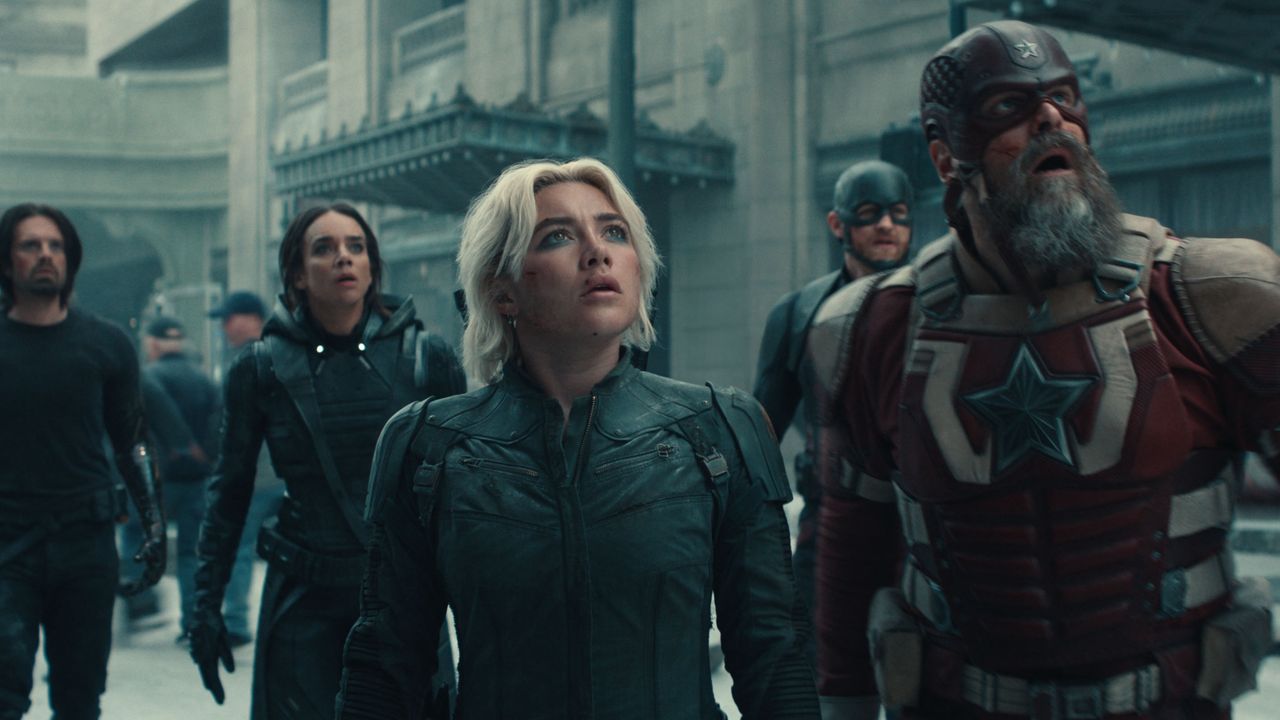After the disappointment of Captain America: Brave New World, and The Marvels before that (and Ant-Man and the Wasp: Quantumania, and Eternals), we p
After the disappointment of Captain America: Brave New World, and The Marvels before that (and Ant-Man and the Wasp: Quantumania, and Eternals), we probably can’t blame Marvel for being a bit down in the dumps. The studio has had some rugged going in the last few years, a steep fall from a decade-plus of utter market dominance, gilded with good reviews. Which might explain the existence of Thunderbolts* (May 2—and yes, the asterisk is meant to be there), a film about dejection and disillusionment and aimlessness.
The movie opens on a morose note, as Florence Pugh’s weary assassin Yelena explains in voiceover that she feels deadened by the loss of her sister (Scarlett Johansson’s Black Widow) and the empty routine of her life. She’s merely going through the motions, which in her case are flips and kicks and punches as she infiltrates some kind of high-tech science facility with deadly results.
Everyone around her is in a similar funk. The Avengers have been lost—to age, to mortality, to expired studio contracts—and the world has become a grayer place. Former killing machine Bucky, a.k.a. the Winter Soldier (Sebastian Stan), is trying his hand at legitimacy as a newly elected congressman, but he seems itchy in that particular suit. Yelena’s dad, Alexei/Red Guardian (David Harbour), is couch-bound and nostalgic for his glory days. The only person who seems to be having any fun is Yelena’s boss, the nefarious deep state wheeler-dealer Valentina (Julia Louis-Dreyfus). But even she is under congressional investigation and feeling the sizzling breath of justice on her neck.
Directed by Jake Schreier and written by Eric Pearson and Joanna Calo, Thunderbolts* is designed as a tale of wayward misfits finding renewed purpose in life. The film leans into the doleful comedy of these once-wicked people contemplating the shambles they’ve made of themselves, while also trying to interrogate something earnest. On occasion the film is wryly amusing. But too often the humor is strained, playing as meek attempt to laugh through the pain—for the characters, the movie itself, the entire franchise, even. “Haha! We are having fun,” says this newly nervous and bruised juggernaut, desperate to recapture the good times but unable to fend off the lingering haunt of a paradise snatched away.
Thunderbolts* is meant to propel Marvel out of its slump and toward its next great era, when a novel team of heroes will emerge and eventually battle a phase-spanning super villain. (In this case, I believe that will be Robert Downey Jr.’s Dr. Doom.) Yelena does indeed find herself in a wary alliance with other murderous gloomy sacks, including Wyatt Russell’s John Walker—who flopped terribly during his brief stint as Captain America—and Hannah John-Kamen’s Ghost, last seen in Ant-Man and the Wasp. But they’re lacking the gleam of the ancient gang. This is partly the fault of their characters’ B-tier status, and partly because time and saturation have made all this superhero stuff feel so much less special. By the time this ragtag band is dragged back to the streets outside Grand Central Station—where the Avengers first did substantial battle together 13 years ago—the “here we go again” of Thunderbolts* is ultimately one of exasperation instead of excitement.
Still, the film is stylishly shot and well performed—especially by Pugh, one of the most magnetic film actors of her generation. The wise-beyond-its-years scratch of her voice is nicely complemented by her nimble comic touch. She’s utterly natural in a story of wholly unnatural things, a uncommon and arduous feat. The film has given her an actual emotional arc to play, and she finds intriguing variations within it. I only wish that Yelena’s journey was drawn out more carefully and thoughtfully; we’re really only given a few scenes to grasp the weight or meaning of it before we’re meant to be deeply moved.
The end result is less than effective, though the attempt is appreciated. As is the film’s curious choice of villain, a mega-hero who is essentially a depressive Superman. There’s a bit of Homelander, from the TV series The Boys, in there too, though I’m not sure Marvel would appreciate that comparison. Either way, the character has an intriguing pathos: his villainy is motivated entirely by personal sorrow rather than any mandate to galactic domination. In that way, Thunderbolts* is almost quaint, a standalone and downbeat little side adventure into the more shadowy corners of a world governed by übermensches.
Alas, downbeat little side adventures are not going to get the Marvel engine back up to full speed. And so Thunderbolts* must, inevitably, draw the rest of the universe toward it, which makes all of its discrete action seem slender and insufficient. Here these weary characters are, trying to tend to their psychic wounds, while the weight of something enormous bears down on them. I suppose that’s the point of the film. But one nonetheless leaves Thunderbolts* wishing the powers that be would simply let them mope in peace.

COMMENTS